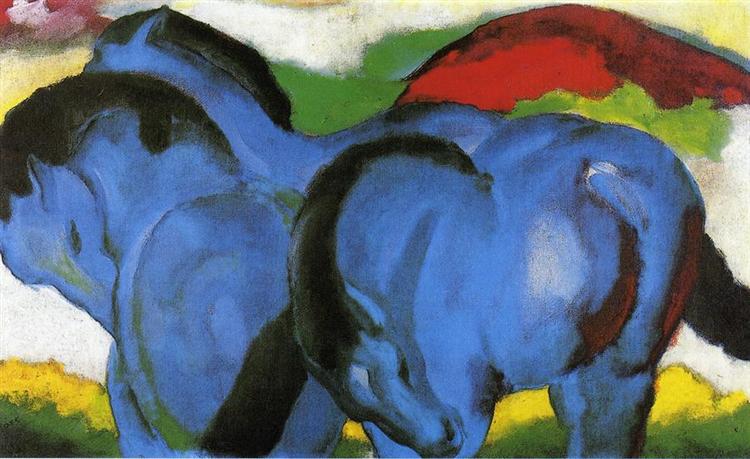Description
Franz Marc's "blue horses" The work painted in 1911, is erected as an emblematic representation of German expressionism, a movement that, at the beginning of the 20th century, sought to break the artistic conventions of the past and explore subjectivity and emotions human through art. In this piece, Marc offers a unique interpretation of the natural world, using his well -known vibrant palette and his symbolic vision of animals.
The composition of the painting revolves around the predominant figure of horses, which are in a diversity of positions. The choice of blue as the main color for these animals is not accidental, but can be interpreted as a search for spiritual purity. In Marc's thought, blue was associated with the masculine, the spiritual and ideal. This detail is essential to understand the intention of the artist by representing these creatures, which evoke a deep connection between the human being and nature.
The horses are not isolated, but are part of an abstract and dreamlike landscape that suggests the interconnection between animals and their surroundings. Each horse is represented in a style that moves away from classical realism, adopting simplified and geometric forms that transcend physical representation and seek to capture the essence of the creature itself. The composition feels dynamic; The horses seem to move, dance in a space that, although abstract, suggests a sense of freedom and life.
The use of color in the work is particularly remarkable. The blue tones of the horses contrast with the green and yellow of the background, creating a vibrant dialogue that attracts the viewer's gaze and invites him to explore the various layers of the work. This contrast not only establishes a visual balance, but also reinforces the idea of duality present in Marc's symbolism: man and nature, the spiritual and the physical, the rational and the instinctive.
The choice of animals as central subjects is fundamental in Marc's work, who was a fervent defender of artistic zoophilia, as he called it. His interest in animals as symbols of purity and authenticity reflects his desire to find a sense of harmony in a world that, in his time, was markedly influenced by industrialization and war. "The blue horse" reflects this search; It is a tribute to the beauty and freedom that he felt that animals represented. Although there are no visible human characters in the work, the presence of these horses becomes a form of invitation to introspection, promoting that the spectator contemplate his own relationship with nature.
Franz Marc, co -founder of the Expressionist Group Der Blaue Reiter, shared with his contemporaries the exploration of coloring and the way as a vehicle to express complex ideas and deep feelings. His work, undoubtedly, supported a strong connection with nature, and "the blue horse" is a testimony of his ability to reinvent the representation of reality through a visual language that was both innovative and deeply symbolic.
This piece is, therefore, not only a prominent example of Marc's style, but also a bridge towards the concerns of his time: a time of change, search for meaning and connection in a world in transformation. "The blue horse" invites each spectator to reflect on the beauty of the natural and to consider a less anthropocentric vision of existence, where art can arise as a means to explore and celebrate life in all its expressions.
KUADROS ©, a famous paint on your wall.
Hand-made oil painting reproductions, with the quality of professional artists and the distinctive seal of KUADROS ©.
Art reproduction service with satisfaction guarantee. If you are not completely satisfied with the replica of your painting, we refund your money 100%.

